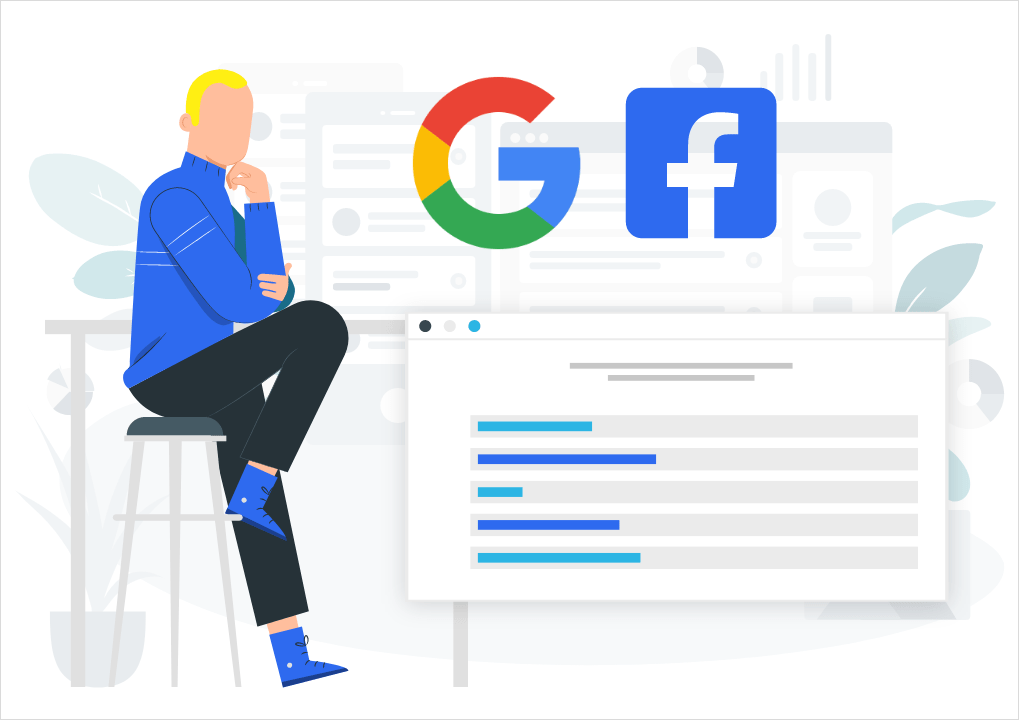The advertising industry keeps changing all the time, Display Ads keep trying to prove effectiveness, advertisers search for new techniques and brands make their best efforts to keep up with them. Just like that, is that our beloved advertising world forces us to adapt, improve and challenge us more and more.
Facing that scenario, the big Ad giants will not remain as simple spectators while the world keeps the innovations coming. Even more, as we’d expect, they will always try to be pioneers and on top of the pyramid. Being used to both Google and Facebook’s intentions and techniques, I was not surprised at all when I read this article from The New York Times on a secret deal that these two Ad industry leaders had made. However, what came after that actually did surprise me. So, why don’t we deep dive into what said deal was all about? Let’s go!
So apparently, back in 2017, Facebook spread the word that they had this huge new online sales idea that would put them in Google Ads’ competitiveness level, and maybe even above them. This was a milestone for the Advertising industry since, even when Facebook and Google are our two Ad Giants by default, we never considered the possibility of Google being taken away from the picture, or at least the top #1 position that they’ve been so used to all these years.
However, four years after the said declaration, we are living in the same Google Ads dominated world that we had in 2017, so what happened? Was it just much ado about nothing? Did their bubble blow up? Or what’s the reason that kept Facebook from beating Google Ads supremacy? Well, definitely, this story’s outcome is much more wicked and controversial than we would have expected… Or is it?
In the beginning, Facebook made no declarations about what had happened with their big project and its development. However, the evidence presented in court last December (regarding an antitrust lawsuit against Google), shows that the reason that Facebook had to back down was one that many of us hadn’t even thought for a second before agreeing: Apparently, Google Ads had offered them a very generous deal to become partners so no one had to be fighting each other. How nice of them, right?
I don’t think there’s any need for me to develop that Google Ads didn’t really do this out of their pure heart intentions to develop the best products and services in the Display Ad industry along with their old pals from Facebook, right? I’m not criticizing, the Display Ad world is complex, and business decisions are priority #1 in order to stay as the biggest giant in a market as competitive as the one we are seeing nowadays.
However, even when I’ve always admired Google Ads’ business strategies, I believe this time they may have stepped over the line and pulled something that none of us had seen before. According to what they said to The New York Times, the rest of the allies that signed said dial did not receive terms as generous as the once Facebook, and so they ended up being at a great disadvantage against the two giants. Even worse, they did not find out about it until the whole presentation of the evidence situation happened.
Among the many advantages Facebook gained with Google’s deal, we find double the average milliseconds to bid for an Ad, special information and speed advantages, a guaranteed win-rate, and even something that Google Ads had forever kept controlled: Facebook had a direct billing relationship with sites their Ads appeared in.
When Google had the opportunity to expose their point of view, not only did they not excuse themselves, but also presented a list of articles in their favor. Everything from how this deal was a great idea to join forces against the rest of the competition, and how that helped every member of the deal no matter each specific’s terms, to how this type of deals (meaning secret and with debatable intentions?) were much more common than everyone thought.
Another controversial fact about this deal is how many times the word “antitrust” is named in it, and apparently, that’s 20. Even when both companies denied that their partnership had anything to do with antitrust matters, there is a clause that literally says that, if they do get investigated for anything regarding any antitrust concerns about their contract they committed to cooperate and assist each other. To me, this sounds, at least, a little sketchy.
But the tangent I’m trying to go by now is one that actually Google’s spokesman brought to the conversation, as previously stated: These sort of deals aren’t an uncommon thing and, if it hadn’t been for the investigation held against Google, we (and apparently their own partners) never would have found out about it.
So, not to be paranoid, but is it possible that we are being constantly surrounded by these controversial and, at least, debate-worthy deals? Is it fair for the rest of the companies, and even the ones they sign contracts with, to compete in a scenario such as this one is turning into? Well, I can’t answer those questions precisely, but I can give you some of my thoughts on them.
My conclusion in all of this secret Ad deal is that, even when it may not be illegal (it’s not up to me to state that), it’s definitely very immoral. Leaving aside their competitors, who I can understand they want to take out in order to control the market (as if they didn’t already), but stepping on your own partners? Come on, that’s way past the line. And I also can understand that Google and Facebook’s partnership needs to be one of a kind because of their own particular characteristics (basically the one that involves them being the two online Advertising leaders), but if that’s going to be your strategy, then you should at least give the rest of the partners a heads up, right?
So today I’m leaving you with more questions than answers, I know and I’m sorry. But, the bottom line here is pretty simple: The Display Ad world is even more sketchy and complex as it seems, and even the biggest one of us need to reinvent ourselves and look for new ideas, deals and strategies in order to remain on top, so don’t be surprised if any other of these sketchy secret deals is presented as another’s investigation evidence.






